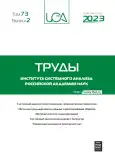Model-oriented programming system
- Authors: Kruglov L.V.1
-
Affiliations:
- Moscow Pedagogical State University
- Issue: Vol 73, No 2 (2023)
- Pages: 59-69
- Section: Mathematical Modeling
- URL: https://journals.rcsi.science/2079-0279/article/view/286992
- DOI: https://doi.org/10.14357/20790279230206
- ID: 286992
Cite item
Full Text
Abstract
The problem of analysis of complex multiple component systems arises in various areas of science and engineering. Modeling and simulation is often the only available approach to it. Such systems can be described in terms of their structure, behavior and interaction of its components (agents). In this work, a programming system for Turing complete “model-oriented” paradigm is proposed, which is based on the concept of “modelcomponent” – a complex structure with fixed characteristics and behavior and without external methods. The set of model-components is closed under the union operation into a containing structure called “model-complex”. The proposed programming system allows to develop models using declarative approach, requires limited application of other paradigms for agent behavior programming and naturally allows parallel computations.
About the authors
L. V. Kruglov
Moscow Pedagogical State University
Author for correspondence.
Email: leonid.kruglov.cmc@gmail.com
Junior research fellow, postgraduate student
Russian Federation, MoscowReferences
- Turnbull Laura et al. Connectivity and complex systems: learning from a multi-disciplinary perspective. Applied Network Science 3.1 (2018):1-49.
- Butler Stacey and James P. O’Dwyer. Cooperation and stability for complex systems in resourcelimited environments. Theoretical ecology 13.2 (2020): 239-250.
- Hu Yunwei, Tarannom Parhizkar and Ali Mosleh. Guided simulation for dynamic probabilistic risk assessment of complex systems: concept, method, and application. Reliability Engineering & System Safety 217 (2022): 108047.
- Brodsky Yu.I. Model’nyj sintez i model’noorientirovannoe programmirovanie [Model synthesis and model-oriented programming]. Moscow: CC RAS, 2013.
- D’souza, Desmond F. and Alan Cameron Wills. Objects, components, and frameworks with UML: the catalysis approach. Addison-Wesley Longman Publishing Co., Inc., 1998.
- Booch Grady et al. Object-oriented analysis and design with applications. ACM SIGSOFT software engineering notes 33.5 (2008): 29-29.
- Selic Bran. The pragmatics of model-driven development. IEEE software 20.5 (2003): 19-25.
- Feiler Peter H., David P. Gluch and John J. Hudak. The architecture analysis & design language (AADL): An introduction. Carnegie-Mellon Univ Pittsburgh PA Software Engineering Inst, 2006.
- Shoham Yoav. Agent-oriented programming. Artificial intelligence 60.1 (1993): 51-92.
- Shoham Yoav. An overview of agent-oriented programming. Software agents 4 (1997): 271-290.
- Rodriguez Sebastian, Nicolas Gaud and Stéphane Galland. SARL: a general-purpose agentoriented programming language. 2014 IEEE/WIC/ACM International Joint Conferences on Web Intelligence (WI) and Intelligent Agent Technologies (IAT). Vol. 3. IEEE, 2014.
- Brodsky Yu.I. Bourbaki’s structure theory in the problem of complex systems simulation models synthesis and model-oriented programming. Computational Mathematics and Mathematical Physics 55.1 (2015): 148-159.
- Kruglov Leonid and Yury Brodsky. ModelOriented Programming. Proceedings of CBU in Natural Sciences and ICT 2 (2021): 63-67.
- Brodsky Yu.I., Kruglov L.V. O strukturnom podhode k konceptual’nomu modelirovaniyu shirokogo klassa krupnomasshtabnyh sistem [About structural approach to conceptual modeling of a wide class of large-scale systems]. Management of Large-Scale System Development (MLSD’2021). 2021.
- Brodsky Yu.I., Pavlovsky Yu.N. Razrabotka instrumental’noj sistemy raspredelennogo imitacionnogo modelirovaniya [Development of instrumental system of distributed simulation modeling]. Journal of Information Technologies and Computing Systems 4 (2009): 9-21.
- Goldin Dina Q. et al. Turing machines, transition systems, and interaction. Information and computation 194.2 (2004): 101-128.
- Burkholder Leslie. The halting problem. ACM SIGACT News 18.3 (1987): 48-60.
- Tarjan Robert. “Depth-first search and linear graph algorithms.” SIAM journal on computing 1.2 (1972): 146-160.
- Brodsky Yu.I., Kruglov L.V. Model-Oriented Programming as a Consequence of the Structural Theory of Multi-Сomponent Complex Systems. International Journal of Education and Information Technologies 15 (2021): 1-12.
Supplementary files









